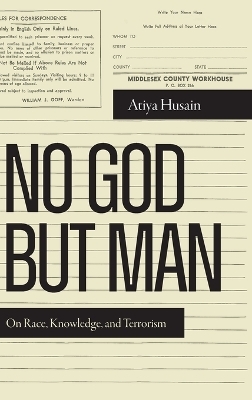
No God but Man
On Race, Knowledge, and Terrorism
Seiten
2025
Duke University Press (Verlag)
978-1-4780-2811-6 (ISBN)
Duke University Press (Verlag)
978-1-4780-2811-6 (ISBN)
- Lieferbar (Termin unbekannt)
- Versandkostenfrei
- Auch auf Rechnung
- Artikel merken
Atiya Husain reconceptualizes the relationship with Islam in the United States by theorizing race as an epistemology using the FBI’s post-9/11 Most Wanted Terrorist list and its posters as its starting point.
Reconceptualizing the relationship between race and Islam in the United States, No God but Man theorizes race as an epistemology using the FBI’s post-9/11 Most Wanted Terrorist list and its posters as its starting point. Atiya Husain traces the origins of the FBI wanted poster form to the work of nineteenth-century social scientist Adolph Quetelet, specifically his overvalued type of human called “average man.” Husain argues that this notion of the human continues to structure wanted posters, as well as much contemporary social scientific thinking about race. Focusing on the curious representations on the Most Wanted Terrorist list that range from Muslims who lack a race category on their posters to the 2013 addition of Black revolutionary Assata Shakur, Husain demonstrates the ongoing influence of the average man and its relevance even today, proposing a counterweight to the category by engaging Shakur’s turn to Islam in the 1970s in the legal context. In doing so, Husain shows the limitations of race as an analytical category all together.
Reconceptualizing the relationship between race and Islam in the United States, No God but Man theorizes race as an epistemology using the FBI’s post-9/11 Most Wanted Terrorist list and its posters as its starting point. Atiya Husain traces the origins of the FBI wanted poster form to the work of nineteenth-century social scientist Adolph Quetelet, specifically his overvalued type of human called “average man.” Husain argues that this notion of the human continues to structure wanted posters, as well as much contemporary social scientific thinking about race. Focusing on the curious representations on the Most Wanted Terrorist list that range from Muslims who lack a race category on their posters to the 2013 addition of Black revolutionary Assata Shakur, Husain demonstrates the ongoing influence of the average man and its relevance even today, proposing a counterweight to the category by engaging Shakur’s turn to Islam in the 1970s in the legal context. In doing so, Husain shows the limitations of race as an analytical category all together.
Atiya Husain is Associate Professor of Africana Studies at Williams College.
Acknowledgments
Introduction
1. L’Homme Moyen and American Anthropometry
2. Assata, The Muslim
3. The Rule of Racelessness
4. Assata, Black Madonna
Conclusion. Race: Theirs and Ours
Notes
Bibliography
Index
| Erscheinungsdatum | 06.12.2024 |
|---|---|
| Reihe/Serie | Global Insecurities |
| Zusatzinfo | 18 illustrations |
| Verlagsort | North Carolina |
| Sprache | englisch |
| Maße | 152 x 229 mm |
| Gewicht | 572 g |
| Themenwelt | Geschichte ► Teilgebiete der Geschichte ► Kulturgeschichte |
| Geisteswissenschaften ► Religion / Theologie | |
| Sozialwissenschaften ► Ethnologie | |
| Sozialwissenschaften ► Soziologie | |
| ISBN-10 | 1-4780-2811-4 / 1478028114 |
| ISBN-13 | 978-1-4780-2811-6 / 9781478028116 |
| Zustand | Neuware |
| Informationen gemäß Produktsicherheitsverordnung (GPSR) | |
| Haben Sie eine Frage zum Produkt? |
Mehr entdecken
aus dem Bereich
aus dem Bereich
der stille Abschied vom bäuerlichen Leben in Deutschland
Buch | Hardcover (2023)
C.H.Beck (Verlag)
CHF 32,15
vom Mittelalter bis zur Gegenwart
Buch | Softcover (2024)
C.H.Beck (Verlag)
CHF 16,80


